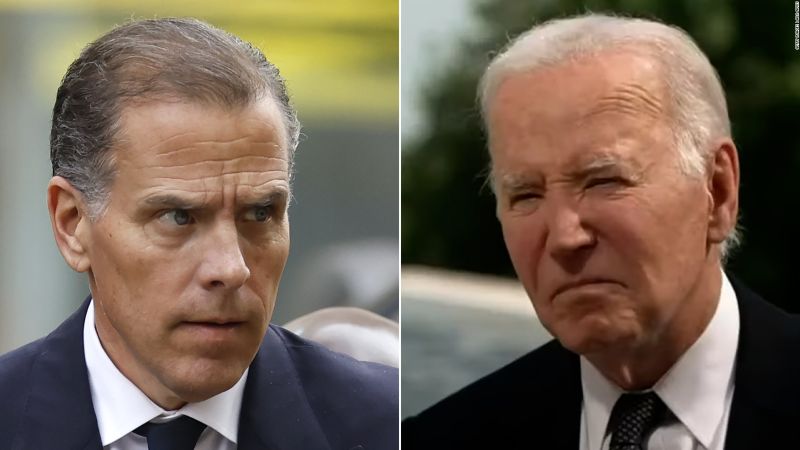During an interview with ABC News, President Joe Biden was asked whether he would pardon his son, Hunter Biden, if he was found guilty in his federal gun trial. President Biden responded that he would not pardon his son in such a situation. This statement comes as Hunter Biden faces scrutiny over his involvement in a gun incident in 2018, where he allegedly provided false information on a background check form in order to obtain a firearm. The trial is ongoing, and it remains to be seen what the final outcome will be.
The issue of pardoning family members in legal trouble is a contentious topic, especially when it involves the President of the United States. Critics argue that pardoning family members could be seen as abuse of power and undermine the rule of law. President Biden’s decision not to pardon Hunter in this case sends a message that he is committed to upholding the principles of justice and fairness, even when it comes to his own family. It also reinforces the idea that everyone, regardless of their familial connections, should be held accountable for their actions under the law.
Hunter Biden’s legal troubles have been a source of controversy and speculation since his father took office as President. The fact that President Biden has publicly stated that he would not pardon his son in the event of a conviction highlights the challenges and responsibilities that come with holding the highest office in the country. It also underscores the importance of maintaining transparency and integrity in the justice system, regardless of personal relationships or political pressures.
The outcome of Hunter Biden’s federal gun trial remains uncertain, and it is unclear what the final verdict will be. However, President Biden’s statement on not pardoning his son in such a scenario reflects a commitment to allowing the legal process to run its course without interference or special treatment. It also highlights the complexities of balancing personal loyalty with the principles of justice and accountability. Ultimately, it is up to the courts to determine the outcome of the trial, and all individuals involved should be treated fairly and impartially under the law.
As the trial unfolds and more details emerge, the public will be closely watching how the legal system handles Hunter Biden’s case. The decision not to pardon him, if he is found guilty, sets a precedent for how the President views the issue of pardons for family members and underscores the importance of respecting the independence of the judiciary. It also serves as a reminder that no one is above the law, regardless of their connections or position of power. The ultimate goal is to ensure that justice is served and that the legal process is upheld with integrity and transparency.
In conclusion, President Joe Biden’s statement on not pardoning his son, Hunter Biden, if he is found guilty in his federal gun trial reflects his commitment to upholding the principles of justice and fairness. It highlights the challenges and responsibilities that come with holding the highest office in the country and underscores the importance of maintaining transparency and integrity in the justice system. The outcome of Hunter Biden’s trial remains uncertain, but it is crucial that all parties involved be treated fairly and impartially under the law. Ultimately, the decision on pardoning family members in legal trouble is a complex issue that requires careful consideration and a commitment to upholding the rule of law.













